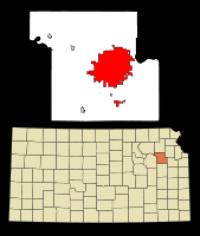
|
| Full name | Topeka, Kansas | | Official name | Topeka, Kansas | | Settlement type | City | | Country | United States | | State | Kansas | | County | Shawnee | | Founded | December 5, 1854 | | Incorporated | February 14, 1857 | | Mayor | Bill Bunten (R) | | Total Area | 57.0 sq mi (147.6 km2) | | Land Area | 56.0 sq mi (145 km2) | | Water Area | 1.0 sq mi (2.6 km2) | | Elevation | 945 ft (288 m) | | Total Population | 127473 (2010) | | Time zone | CST (UTC-6) | | - Summer (DST) | CDT (UTC-5) | | ZIP Codes | 66601-66612, 66614-66622, 66624-66626, 66628-66629, 66636-66637, 66642, 66647, 66652-66653, 66667, 66675, 66683, 66692, 66699 | | Area code | 785 | | FIPS code | 20-71000 | | GNIS feature ID | 0485477 |
|
|
Topeka (-entɵˈpiːkəpron; Kansa: Tó Pee Kuh) is the capital city of the U.S. state of Kansas and the county seat of Shawnee County. It is situated along the Kansas River in the central part of Shawnee County, located in northeast Kansas, in the Central United States. As of the 2010 census, the city population was 127,473. The Topeka Metropolitan Statistical Area, which includes Shawnee, Jackson, Jefferson, Osage, and Wabaunsee counties, had an estimated population of 230,824 in the year 2009. The city is well known for the landmark United States Supreme Court case Brown v. Board of Education of Topeka, which overturned Plessy vs. Ferguson and declared segregation in public schools on account of race to be unconstitutional. Three ships of the US Navy have been named USS Topeka in honor of the city.
Topeka means "to dig good potatoes" in the languages of the Kansa and the Ioway. The potato referred to is the prairie potato (Psoralea esculenta), a perennial herb which is an important food for many Native Americans. As a placename, Topeka was first recorded in 1826 as the Kansa name for what is now called the Kansas River. Topeka's founders chose the name in 1855 because it "was novel, of Indian origin and euphonious of sound." The mixed-blood Kansa Indian, Joseph James, called Jojim, is credited with suggesting the name of Topeka. The city, laid out in 1854, was one of the Free-State towns founded by Eastern antislavery men immediately after the passage of the Kansas-Nebraska Bill. In 1857, Topeka was chartered as a city.
|
|
|




 RSS
RSS